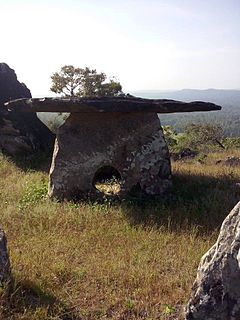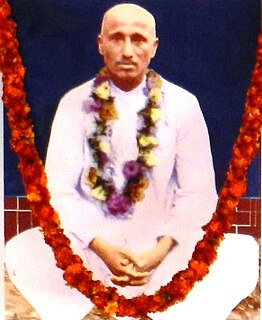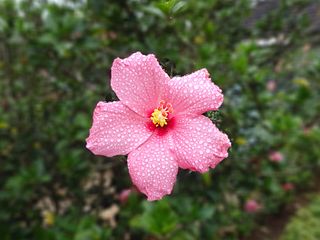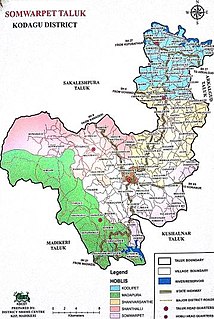
Kodagu is an administrative district in the Karnataka state of India. Before 1956, it was an administratively separate Coorg State, at which point it was merged into an enlarged Mysore State.

Madikeri is a hill station town in Madikeri taluk and headquarters of Kodagu district in Karnataka, India.
Swami Shambhavananda (1894–1972) was an Indian Hindu monk who pioneered beekeeping in Kodagu and secondary education in Mysore.

The Kodava people or Kodavas are an ethno-linguistic group from the region of Kodagu in the southern Indian state of Karnataka, who natively speak the Kodava language. They are traditionally land-owning agriculturists and patrilineal, with martial customs. Kodavas worship ancestors and weapons. They used to worship swords, bows, arrows and later guns. Hence, Kodavas are the only ones in India permitted to carry firearms without a license.
The town of Virajpet also spelled as Virajapete is the second town of the district of Kodagu (Coorg), in Karnataka. It is the main town of the Virajpet taluka, south of the district, in the Kerala-Karnataka border. The name is an abbreviation of Virarajendrapete after the former ruler of Kodagu, Virarajendra.

The district of Kodagu in present-day Karnataka comprises the area of the former princely state of the same name.

Bhagamandala is a pilgrimage place in Kodagu district of the Indian state of Karnataka.
The clan of Kodavas in the Indian state of Karnataka have a long history of association with the game of field hockey. The district of Kodagu which is the land of the Kodavas is considered as the cradle of Indian hockey. More than 50 Kodavas have represented India in international hockey tournaments, out of which 7 have also participated in Olympics. B P Govinda, M P Ganesh, M M Somaiya, C S Poonacha are some of the prominent Kodavas who have represented India. The passion for hockey in Kodagu is so much that more than 200 families participate in an annual hockey festival. This festival is recognised as one of the largest field hockey tournaments in the world and has been referred to the Guinness Book of Records. However it has already found a mention in the Limca Book of Records, which is an Indian variant of the Guinness Book.

Sulimalthe is a village in the Kodagu district of the Indian state of Karnataka.

Appachcha Kavi was an Indian poet and playwright. He belonged to the Kodava community. He is known as the first playwright in the Kodava language.
Nadikerianda Chinnappa (1875–1931) was an Indian compiler, poet, translator, army man, police officer, cricket player, singer and philanthropist from Kodagu.
B. D. Ganapathy was a noted writer, scholar and journalist writing in English, Kannada and Kodava Takk, covering religion, anthropology and philosophy. He is particularly noted for his coverage of the Kodagu (Coorg) region and the Kodava ethno-linguistic group, his own birthplace and community.

Appaiah Swami or Sadguru Appayya Swami was a Hindu Indian spiritual master who lived in Virajpet town, in Kodagu, Karnataka, India.

Coorg Province was a province of British India from 1834 to 1947 and the Dominion of India from 1947 to 1950. Mercara was the capital of the province. It was administered by a Commissioner and later, Chief Commissioner appointed by the Government of India. The Chief Commissioner, was usually based in Bangalore. From 1834 to 1881, the Chief Commissioner, was also the Commissioner of Mysore. From 1881 to 1940, the Chief Commissioner was usually the British Resident to the princely state of Mysore.

Palanganda T. Bopanna is an author and journalist from Kodagu (Coorg) in Karnataka, India. Bopanna has worked for some of the leading Indian English dailies, including The Times of India, Bangalore, for 12 years, and The Pioneer, as their Special Correspondent (Bangalore) for 13 years. He has written five books.
The Kodava Maaple, also known as Jamma Maaple, is a Muslim community residing in Kodagu district of Karnataka in southern India. They are Sunnis of the Shafi'i madhab, and contract marriage alliances with Mappilas and Bearys. They speak Malayalam, although now they do follow some Mappila and Beary customs also.

Virajpet Clock Tower is a clock tower in the town of Virajpet in Kodagu district, in the Indian State of Karnataka. The tower was built to commemorate the coronation of George V at the Delhi Durbar in 1911, and was inaugurated in 1915. To mark its centenary, a philatelic cover was released by Karnataka Postal Circle on 16 January 2015.

Maldare is a small village in Kodagu district of Karnataka state, India.

Chettalli is a small village near Siddapura, Kodagu in Karnataka state, India.

Somawarpete taluk is one of the five taluks of Coorg district. Its administrative headquarters is in the town of Somwarpet.















